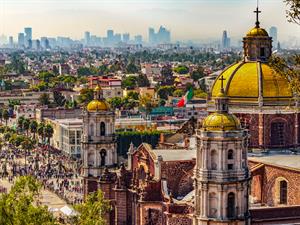OTRĀ SEMESTRA NOSLĒGUMA TESTI
Read the text "Mexico City and the crisis of urbanization".

Last week I went to Mexico and surveyed families living in various places in Mexico City. It is one of the worlds largest cities in population. It sits in a high basin surrounded by mountains around 7,000 feet above sea level and is called the Valley of Mexico. In 1325 the Aztecs founded a city called Tenochtitlan. In 1521, Spain conquered the Aztec Empire and destroyed it. Finally in 1821, Mexico won its independence from Spain and Mexico City became the capital of the new country.
However, I also found out that there were several problems, so I wanted to figure out where these originated from.
Rural decline in the country sides causes urban migration. Only 15 percent of the land in Mexico is suitable for farming and most of the best land is held by a small number of wealthy owners. So many of the farmers sell their land and migrate to the city. But it is hard to find jobs for them. In conclusion, poverty and unemployment have increased in rural Mexico.
There are many problems caused by rapid urbanization in Mexico City. Although Mexico City is expanding, there is still not enough land or housing. Urbanization has caused other problems, too. Clean water is in short supply, traffic jams are always occurring, and public transportations are packed. One of the city’s worst environmental problems is air pollution.
As shown in the photograph, a cloud of smog often hangs over the city. For example, when I got off the taxi, it was really hard to find my way to the houses because I couldn't see anything that was across the street! Also poverty, crime, and unemployment have increased because of urbanization.
Spatial inequality is also another major problem in Mexico City. The poor make up the majority of the city's population. They live in cinder-block homes or large tenements and some houses may lack water. The rich are members of Mexico City's middle and upper classes. They make up around one fourth of cities population.
Fill in the gaps. Write four words into each gap.
1. It sits in a mountains around 7,000 feet above sea level and is called the Valley of Mexico.
2. One of the city’s air pollution.
3. The rich are members of Mexico City's .
Atsauce:
http://www.exampleessays.com/viewpaper/208669.html
Lai iesniegtu atbildi un redzētu rezultātus, Tev nepieciešams autorizēties. Lūdzu, ielogojies savā profilā vai reģistrējies portālā!